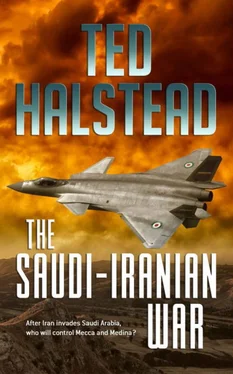Ted Halstead - The Saudi-Iranian War
Здесь есть возможность читать онлайн «Ted Halstead - The Saudi-Iranian War» весь текст электронной книги совершенно бесплатно (целиком полную версию без сокращений). В некоторых случаях можно слушать аудио, скачать через торрент в формате fb2 и присутствует краткое содержание. Год выпуска: 2019, Издательство: Independently published, Жанр: Боевая фантастика, Триллер, на английском языке. Описание произведения, (предисловие) а так же отзывы посетителей доступны на портале библиотеки ЛибКат.
- Название:The Saudi-Iranian War
- Автор:
- Издательство:Independently published
- Жанр:
- Год:2019
- ISBN:нет данных
- Рейтинг книги:4 / 5. Голосов: 1
-
Избранное:Добавить в избранное
- Отзывы:
-
Ваша оценка:
- 80
- 1
- 2
- 3
- 4
- 5
The Saudi-Iranian War: краткое содержание, описание и аннотация
Предлагаем к чтению аннотацию, описание, краткое содержание или предисловие (зависит от того, что написал сам автор книги «The Saudi-Iranian War»). Если вы не нашли необходимую информацию о книге — напишите в комментариях, мы постараемся отыскать её.
The Saudi-Iranian War — читать онлайн бесплатно полную книгу (весь текст) целиком
Ниже представлен текст книги, разбитый по страницам. Система сохранения места последней прочитанной страницы, позволяет с удобством читать онлайн бесплатно книгу «The Saudi-Iranian War», без необходимости каждый раз заново искать на чём Вы остановились. Поставьте закладку, и сможете в любой момент перейти на страницу, на которой закончили чтение.
Интервал:
Закладка:
Reza gestured impatiently, which Farhad knew meant to move on from the obvious.
“I thought ‘Renaissance’ sounded plausible, and though it has been used by a few political parties in North Africa, I could find no organizations resisting governmental authority using the name.”
Reza’s face twisted with distaste. “You spent too much time at that American university. ‘Organizations resisting governmental authority’? I think you mean ‘terrorist’.”
Farhad smiled. “Well, I know you agree with me that those of us in the organization’s leadership are certainly not terrorists.”
As he saw Reza’s face begin to turn crimson Farhad thought maybe he had gone too far. After a few seconds, though, he saw Reza visibly regain control.
“You have a point. Did you know that Al-Nahda, besides the general meaning of Renaissance, also refers to a specific cultural movement that began in Egypt about one hundred thirty years ago, and then spread to Ottoman territories?”
Farhad nodded. “Yes, but I don’t believe that movement is well known to many besides scholars such as yourself. Anyway, I don’t think it stops us from reusing the term.”
Reza nodded absently. “I agree. So, what are your next steps?”
Farhad shrugged. “I will be busy. I plan to meet my Saudi friend in Brussels, where we are unlikely to be tracked by Saudi intelligence. While I am here in Iran I will meet with my uncle. Finally, I will meet with the Qatari prince who had expressed interest in striking back against the reimposed Saudi blockade.”
Reza smiled. “Yes, you will indeed be busy. Now, what do you need from me?”
Farhad hesitated. “I know this is a delicate subject. But since we last talked, have you given further thought to arming the ballistic missiles we have been providing to the Yemeni rebels with VX warheads? Unless we strike the Saudi’s air bases with them, any armored advance we organize towards Riyadh can be easily destroyed from the air.”
Reza grimaced. “I’m sorry I told you we had them. When I saw we had the technical capability I ordered the production of VX as a way to retaliate against an Israeli nuclear attack, and we only have enough for two warheads.
The truth is Ayatollah Khomeini himself told me he wanted Iran to avoid such weapons at all costs. He saw what they could do when Iraq used them against us in the 1980s, and considered them truly evil.”
Farhad spread his hands and nodded his understanding. “But he was thinking about their use against hundreds of thousands on the battlefield, as happened against us. The number of casualties from strikes on Saudi air bases will be far less. And we must be practical. Most of the Saudi’s planes will be in hangers hardened against anything short of a direct missile hit if we use a warhead armed with only conventional explosives. A VX strike will kill most of their trained pilots and contaminate the planes, making them useless.”
Reza sighed. “Very well. I will give the necessary orders. Some experts in the West must suspect we have a chemical weapons program anyway.”
Farhad frowned. “How is that? I have seen nothing in the press, and our enemies are normally very free with their accusations.”
Reza nodded. “It was a small slip, and by itself proves nothing. Our chemists synthesized five Novichok nerve agents for analysis and added descriptions of their spectral properties to the database of the Organization for the Prohibition of Chemical Weapons.”
Farhad stared. “When did they do this?”
Reza arched one eyebrow. “2016.”
Farhad shook his head. “Two years before the Russians used Novichok to attack the spy in England who had betrayed them and his daughter.”
Reza shrugged. “Yes. Fortunately, the OPCW’s reaction was to congratulate us for adding information to their database that had not previously been available in open scientific literature.”
Farhad smiled. “Amazing. Now, I know our missile program suffered a heavy blow when General Moghaddam was killed in 2011, and that development of improved ballistic weapons was set back for years. Has it finally been possible to make Khorramshahr 2 missiles available to the Yemenis?”
Reza nodded. “Yes. Their two thousand kilometer range and improved accuracy will make a meaningful hit on Riyadh far more likely.”
Farhad smile broadened. “Excellent. We will need to convince the Saudis the threat from Yemen is real if we are going to draw a substantial amount of their army south.”
Farhad then frowned. “Of course, there’s no way to be sure that this plan will work. The Saudis could simply leave Yemen and end their blockade against Qatar, and it would be over.”
Reza nodded gravely. “As always, we must put our faith in God. If we are carrying out his will, obstacles will fall before us. If not, then it was not meant to be.”
Reza paused. “Of course, he still expects our best effort.”
Farhad smiled. “Naturally. Now, once I find out from my uncle what we have to work with, can I call upon you for help with transport?”
Reza gestured dismissively. “Of course. I know for a fact that the program developed at least one nuclear weapon and that it still exists, but could find out no more without arousing suspicion. That is one secret that is truly… secret. As it should be. It would be unfortunate if our enemies in the West were to learn of it. Even worse if the first to find out were the cursed Zionists.”
Farhad nodded vigorously, but said nothing. Everyone knew the Zionists had nuclear weapons, and if they learned of their existence in Iran might use one or more to make sure Iran had them no longer.
Reza continued, “I have men loyal to the Revolution with access to trucks, ships and planes. Simply tell me what you need.”
Farhad rose, understanding both the reference to the 1979 Iranian Revolution that had installed the current theocracy, and that their meeting was over. “I hope soon to report on further progress towards our goal.”
Reza nodded irritably as Farhad beat a hasty retreat. At his age, Reza had no time for pleasantries. His fondest hope was that instead he still had the time needed to keep Iran true to the Revolution and its sacred goals.
“I know how to bring down the House of Saud,” Abdul Rasool declared with a confidence his Iranian friend Farhad Mokri found amusing. He was, though, successful in keeping the smile from his lips.
“Well, if anyone would know how, I’d expect it to be a Saudi,” Farhad said gravely. “Let us keep our voices down, though. Even here, you can never be sure who is listening,” he said, looking around the square as he spoke, and taking a sip of the excellent Belgian coffee.
It was a chilly and windy March morning, and Brussels’ Grand Place had very few tourists in it besides Abdul and Farhad. The waitress had looked at them dubiously when they told her they wanted a table outside, but had shrugged when Farhad had explained they wanted to “take in the view.” And it was spectacular, with impressive structures on all sides enclosing a vast space, dwarfing their small table.
After delivering their coffees the shivering waitress had beat a hasty retreat and given Abdul and Farhad, bundled in warm jackets, the privacy that was the real point of their selection.
“We do it by taking away the source of their income. Ultimately, the Saudi monarchy depends on the money coming in from the sale of petroleum, both refined and crude. Take that away, and the whole structure collapses,” Abdul said confidently.
Farhad nodded. “In general, I agree with you. We must remember that the House of Saud has used its oil money to buy vast assets overseas, such as the refinery at Port Arthur, Texas which is the largest in the US. But many of those assets, like that refinery, could not quickly be turned into cash to pay bills at home.”
Читать дальшеИнтервал:
Закладка:
Похожие книги на «The Saudi-Iranian War»
Представляем Вашему вниманию похожие книги на «The Saudi-Iranian War» списком для выбора. Мы отобрали схожую по названию и смыслу литературу в надежде предоставить читателям больше вариантов отыскать новые, интересные, ещё непрочитанные произведения.
Обсуждение, отзывы о книге «The Saudi-Iranian War» и просто собственные мнения читателей. Оставьте ваши комментарии, напишите, что Вы думаете о произведении, его смысле или главных героях. Укажите что конкретно понравилось, а что нет, и почему Вы так считаете.












